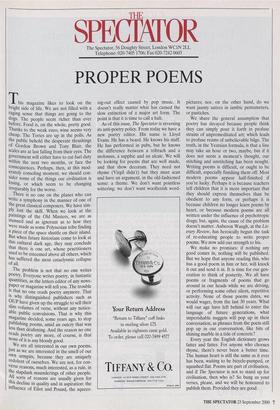SPECTATOR
The Spectator, 56 Doughty Street, London WC1N 2LL Telephone: 020-7405 1706; Fax 020-7242 0603
PROPER POEMS
There is no one on the planet who can write a symphony in the manner of one of the great classical composers. We have sim- ply lost the skill. When we look at the paintings of the Old Masters, we are as stunned and as ignorant as to how they were made as some Polynesian tribe finding a piece of the space shuttle on their island. But when future historians come to look at this cultural dark age, they may conclude that there is one art, whose practitioners used to be esteemed above all others, which has suffered the most cataclysmic collapse of all.
The problem is not that no one writes poetry. Everyone writes poetry, in fantastic quantities, as the letters editor of any news- paper or magazine will tell you. The trouble is that no one reads poetry anymore. That is why distinguished publishers such as OUP have given up the struggle to sell their slim volumes of verse, without any notice- able public convulsions. That is why this magazine decided, some years ago, to stop publishing poems, amid an outcry that was less than deafening. And the reason no one reads poetry any more, of course, is that none of it is any bloody good. We are all interested in our own poems, just as we are interested in the smell of our own armpits, because they are uniquely redolent of ourselves. We are not, for con- verse reasons, much interested, as a rule, in the slapdash maunderings of other people. All sorts of reasons are usually given for this decline in quality and in aspiration: the influence of Eliot and Pound, the squeez- ing-out effect caused by pop music. It doesn't really matter what has caused the slow extinction of a major art form, The point is that it is time to call a halt.
As of this issue, The Spectator is reversing its anti-poetry policy. From today we have a new poetry editor. His name is Lloyd Evans. He has a beard. He knows his stuff. He has performed in pubs, but he knows the difference between a tribrach and a molossus, a sapphic and an alcaic. We will be looking for poems that are well made, and that show decorum. They need not rhyme (Virgil didn't) but they must scan and have an argument, in the old-fashioned sense: a theme. We don't want pointless wittering; we don't want woofterish word- pictures; nor, on the other hand, do we want jaunty satires in iambic pentameters, or pastiches.
We share the general assumption that poetry has decayed because people think they can simply pour it forth in profuse strains of unpremeditated art; which leads to profuse reams of unbelievable bilge. The truth, in the Yeatsian formula, is that a line may take an hour or two, maybe, but if it does not seem a moment's thought, our stitching and unstitching has been nought. Writing poems is difficult, or ought to be difficult, especially finishing them off. Most modern poems appear half-finished if you're lucky. Perhaps it is because teachers tell children that it is more important that they should express themselves than be obedient to any form, or perhaps it is because children no longer learn poems by heart, or because modern poems are all written under the influence of psychotropic drugs; but, again, the cause of the problem doesn't matter. Auberon Waugh, at the Lit- erary Review, has heroically begun the task of re-educating people to write proper poems. We now add our strength to his.
We make no promises: if nothing any good comes in, nothing will be published. But we hope that anyone reading this, who has a good poem in him or her, will knock it out and send it in. It is time for our gen- eration to think of posterity. We all have poems or fragments of poems that go around in our heads while we are driving, or performing some other silent, repetitive activity. None of those poems dates, we would wager, from the last 30 years. What will our age have left behind to enter the language of future generations, what imperishable nuggets will pop up in their conversation, as phrases from the poets still pop up in our conversation, like bits of shining marble in a tide of concrete?
Every year the English dictionary grows fatter and fatter. For anyone who chooses rhyme, there's never been a better time. The human heart is still the same as it ever has been, waiting to be bicycle-pumped, or squashed flat. Poems are part of civilisation, and if The Spectator is not to stand up for civilisation, then who is? So bung us your verses, please, and we will be honoured to publish them. Provided they are good.






















































































 Previous page
Previous page